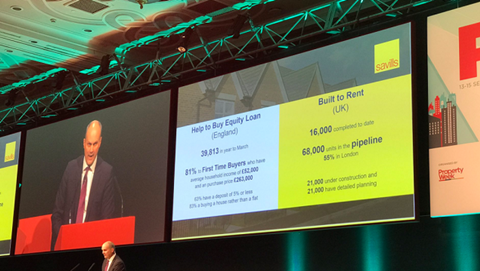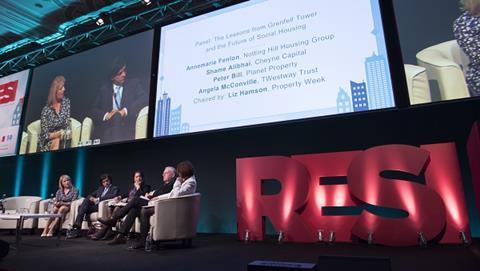This year’s RESI took place at a testing time for the residential property market.

The conference got under way at Celtic Manor last week, just as the latest RICS residential market survey was published showing that sentiment in the central London market was at its weakest point since 2008and that elsewhere in the UK housing market activity was slowing.
However, the speakers at RESI showed that there was still plenty to be positive about. The build-to-rent sector is finally coming of age, the industry is embracing proptech and modular construction is helping developers build more quickly and efficiently.
The conference also provided an opportunity to hear the first major public speech from the new housing and planning minister Alok Sharma, who outlined the government’s latest thinking and gave an update on implementing the proposals in the housing white paper.
Here are 10 of the key takeaways from the conference floor:
1) Quality matters

One of the key messages of Sharma’s speech was that quality matters, not just quantity. He said that in the past couple of months he had been struck by one fact in particular – that 16% of new homebuyers would not recommend their homebuilder to a friend, up from 10% four years ago, according to a recent Home Builders Federation (HBF) survey.
“In any other market, this would spell the end of the most poorly performing companies,” he said. He also described existing mechanisms for redress such as the Consumer Code for Home Builders as complex and incomplete.
So what could this mean for policy? Sharma referenced growing calls in parliament for a new homes ombudsman and said he looked forward to reviewing the recommendations of an upcoming report commissioned by the HBF looking at consumer protection in the new-homes market.
Find out more - RESI 2017: Housing minister calls on housebuilders to ‘step up’ on quality
2) The white paper
Sharma set out a timetable for turning the white paper into action. Early in 2018, a combined response will be published to the consultation earlier this year on proposals in the white paper and the newly launched consultation on local housing need, he said.
The minister also indicated that proposals in the white paper to tackle the problem of underresourced planning departments could be beefed up. He said the necessary regulations to apply the 20% increase in planning application fees – promised in the white paper for local authorities that commit to investing the extra money in their planning departments – would be brought forward in the autumn.
The government was also “minded” to allow a further 20% for councils that are delivering the homes their communities need, he said.
Find out more: Will Sharma be the one to stand up to the Treasury and deliver real housing growth?
3) ‘Marxist agenda
For potential build-to-rent (BTR) investors worried about rent controls, Sharma’s message couldn’t have been more categorical: “Let me be absolutely clear: under this government rent controls are not going to happen. That’s an agenda of the Marxists.”
4) BTR growth
The BTR sector is finally starting to build at scale. Lucian Cook, head of residential research at Savills, said 21,000 units were currently under construction – more than the 16,000 that have been delivered to date. Investors in the sector said they were confident that it could play a major role in easing the housing crisis.

Dan Batterton, BTR fund manager at Legal & General Investment Management, said he thought it could contribute around 100,000 homes to the government’s target to build 250,000 homes a year.
Find out more: Homing in on key issues at #RESIdebate
5) Debt difficulties
One of the few barriers still facing the BTR sector is access to debt finance. The government’s £3.5bn private rented sector (PRS) guarantee scheme, run by Venn Partners, has helped provide a cheap source of finance for BTR schemes once they’re built.
To demonstrate the success of the scheme, Sharma revealed that approvals had already topped £1bn.

However, Lesley Chen Davison, portfolio and corporate finance executive at Delancey, said developers continued to struggle to secure affordable development loans because the lack of pre-lets and pre-sales on BTR schemes means they are treated by lenders as speculative.
Under current banking regulations, this makes it hard for banks to fund the sector, one delegate complained to the minister.
Find out more: BTR lending market springs to life with landmark deals
6) Stamp duty
The stamp duty reforms introduced by former chancellor George Osborne have undoubtedly slowed the top end of the residential market.
However, given that transactions across the whole of the market haven’t fallen and tax receipts have increased, Residential Land chief executive Bruce Ritchie conceded that persuading the Treasury to make the sort of changes advocated by Property Week’sCall Off Duty campaign was a hard sell.
If chancellor Philip Hammond could at least ensure there were no further tax raids on the industry, that would be something, he said: “We should have a moratorium on an immediate basis so the market can regain confidence and be allowed to grow.”
However, Adam Smith Institute head of research Ben Southwood said he would continue to make the case for an overhaul of the stamp duty tax regime on the grounds it was “economically inefficient” and discouraged people from moving to take up new jobs.
7) Market slowdown
Transaction levels across the market may have held steady in the wake of Osborne’s stamp duty reforms, but they remain well down on pre-financial crisis levels. This is particularly true among London homeowners and mortgaged buyto-let investors, which are two of the groups hardest hit by the reforms.
Savills’ Cook said transactions attributable to mortgaged buy-tolet investors were down 60% on 2007 levels and down 84% among existing homeowners moving within London.
Find out more - RESI 2017: Housing transaction numbers still not recovered from credit crunch
8) Proptech power
After a slow start, the sector is starting to embrace the power of technology.
A panel of proptech’s leading lights including Built-ID founder Savannah de Savary and Brickowner’s Fred Bristol concluded that “the gap between technology and property is narrowing but there’s still some distance to go”.
9) Modular housing
One technology that’s expected to transform the industry is modular construction. Rosie Toogood, chief executive of L&G’s modular homes business, said modular would make homebuilding far easier and more efficient. It was not just about “bringing into a factory what we do on a construction site; it’s fundamentally changing the way we go about building”, she said.

Toogood also provided an update on L&G’s progress to date. Some 50 people are working in its factory in Leeds at the moment and the first homes will be built next year. Once the factory is up to full capacity, it will employ 400 people and build about 20 units a day.
Find out more: L&G unveils first modular prototype 
10) Grenfell
As the inquiry into the Grenfell Tower fire kicked off in London, industry representatives discussed the lessons to be learned. Westway Trust chief executive Angela McConville said the tragedy showed a “devastating vacuum of leadership” and called for a “slower, deeply engaged” development process to build trust.

Cheyne Capital partner and manager, social property funds, Shamez Alibhai added that section 106 should be treated not as an “obligation” by developers, but as a “responsibility”. He added that the fire highlighted the critical role of good building management.






























No comments yet